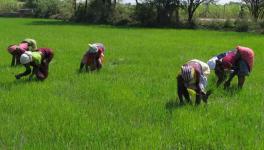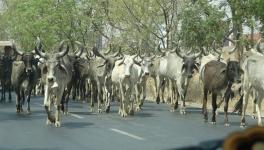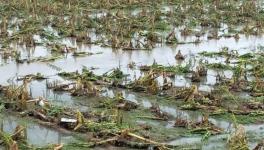Crop Damage: Farmers Bear Brunt of Erratic Rains, Experts See no Impact on Food Security
Representational use only.Image Courtesy: Flickr
New Delhi: A marginal drop in the Kharif crop output due to uneven distribution of rain this monsoon season is unlikely to impact food security or drive inflation up as India has enough reserves, agriculture and food policy experts have said.
They, however, said farmers, at the individual level, have been hit the hardest by the highly erratic monsoon and many have not yet received help from state governments.
According to the advanced estimates released by the Union Agriculture Ministry on Wednesday, the Kharif rice output is likely to decline by 6% -- from 111 million tonnes last year to 104.99 million tonnes this year -- in light of poor rains in key rice-producing states.
The acreage under paddy, the main summer staple, dropped from 41.7 million hectares last year to 39.9 million hectares this year, government data showed.
The monsoon has given surplus rains in south and central India, while east and northeast India have reported precipitation deficit, said Mahesh Palawat, vice president (meteorology and climate change), Skymet Weather.
The estimated dip in the Kharif rice output is linked to deficient rainfall in the Indo-Gangetic plains (IGP), especially in east Uttar Pradesh, Bihar, Jharkhand and West Bengal, from June to August. At the same time, central India reported damage to crops due to excess rain during this period, he said.
Farmers in parts of Rajasthan, Gujarat and Madhya Pradesh have been reporting damage to soyabean, urad and maize crops due to late rain in September. Wet conditions have delayed harvesting in these areas.
However, the ongoing rain and the delayed withdrawal of the monsoon will help farmers in Uttar Pradesh in the sowing of mustard, the meteorologist said.
Uttar Pradesh has received 33% less rainfall than normal. Bihar, Jharkhand and West Bengal have reported a rain deficiency of 30%, 20% and 15%, respectively, as on September 22.
Till July 15, Uttar Pradesh, Bihar, Jharkhand and West Bengal had a rain deficit of 65%, 42%, 49% and 24%, respectively. Gujarat has gauged 31% excess rainfall (901.2 mm against the normal of 685.7 mm) since June 1, while Maharashtra and Madhya Pradesh have got 26% and 24% excess precipitation.
Vinay Sehgal, a senior scientist at the Indian Agricultural Research Institute, said the overall situation is "not alarming" as the monsoon had revived in the latter half of the season.
"The delayed withdrawal of the monsoon will further help in recovery in the IGP and the deficit in the rice production is likely to come down to 4%," he said.
He said the extent of damage to crops due to excess rains in central and south India "should not be too much as per the reports received".
"There will not be much impact in terms of inflation as the government has already taken preventive steps," the senior scientist said.
Earlier this month, the Centre banned the export of broken rice while flagging an increase in prices, a shortage in supply for domestic requirements and an “abnormal” increase in exports.
A day before, it imposed a 20% export duty on all non-basmati rice except par-boiled rice.
Sehgal said the international prices are likely to go up due to India banning the export of broken rice, massive damage to paddy crops in Pakistan due to unprecedented floods and the Ukraine war.
G V Ramanjaneyulu, Executive Director, Centre for Sustainable Agriculture, said there will be no impact on overall production and that India has sufficient stocks.
"So, there will not be any impact in terms of food security and inflation at the national level," he told PTI.
However, it is certainly going to affect individual farmers. Even if 6% is not so much at the national level, some farmers may lose their entire crop, the agriculture expert said.
The short-term solution is that their losses are mandatorily covered either through crop insurance or disaster compensation.
"However, only 30% farmers in India have their crops insured. State governments have been refusing compensation to them. Even if they do, they take a lot of time to conduct damage assessment and make payments," Ramanjaneyulu alleged.
Food and trade policy expert Devinder Sharma said India has enough food grain stock and there is no reason to panic even if the rice production drops by 6%.
He said the sad part is that everybody is worried about inflation and not about farmers.
"The impact on the rice production in east Uttar Pradesh, Bihar, Jharkhand and West Bengal means around 30 crore farmers have been affected but no one is talking about them. The government should announce stimulus packages. If it can be done for the corporate sector, it can be done for farmers too," Sharma said.
Stressing the need to regulate the market, he said: "The prices of rice have gone up even when we have 40 million tonnes of surplus rice."
Get the latest reports & analysis with people's perspective on Protests, movements & deep analytical videos, discussions of the current affairs in your Telegram app. Subscribe to NewsClick's Telegram channel & get Real-Time updates on stories, as they get published on our website.
























